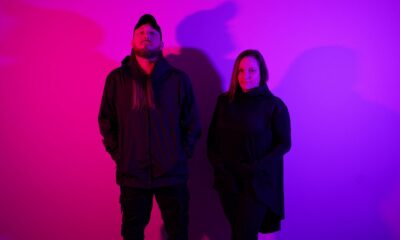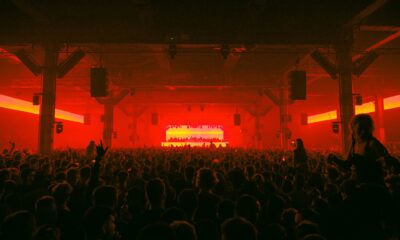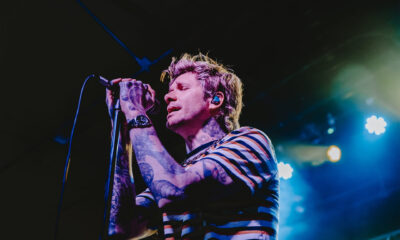Dance/Electronic
Author & Punisher Brainchild Tristan Stone Takes Us Into the World of Drone Machines [w/ Audio]
With a new album out and the launch of a new business, Author & Punisher brainchild Tristan Stone had plenty to talk to us about recently.
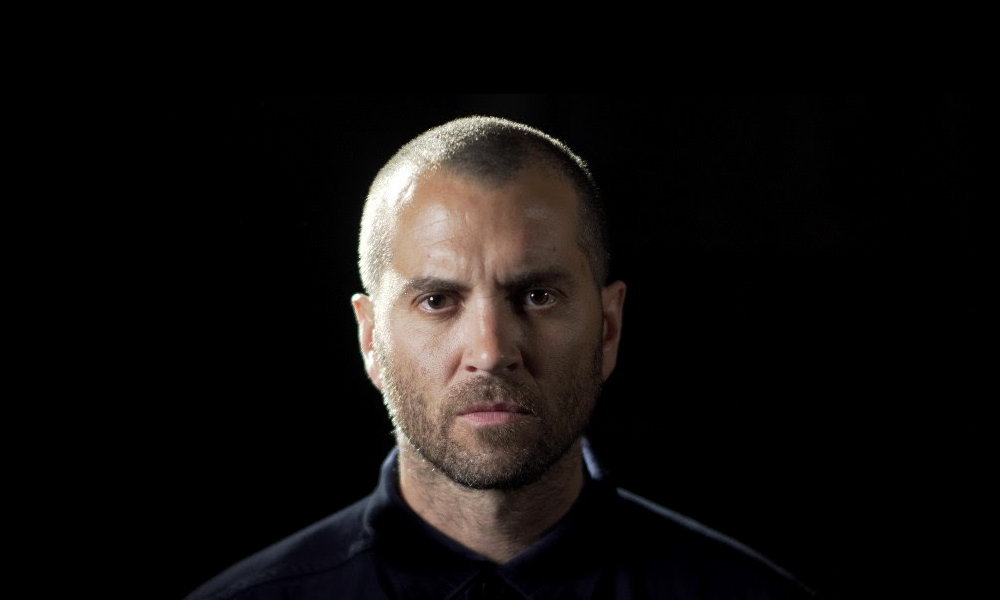
A lot of bands and artists we have spoken to over the last couple of years have discussed taking the time to re-evaluate their sound and their music. For one artist though, Tristan Shone aka Author & Punisher, the pandemic related lockdowns gave him the chance to do this and much more. Following the release of his latest album, Kruller, and the launch of his new company Drone Machine, we grabbed Tristan for a quick chat about the album and his new venture.
Thanks for your time. So, your excellent new album is out. Going back to the beginning of the whole process for the album, did you have a vision for what you wanted to achieve with it or how you wanted it to turn out?
Tristan Stone: “Well, I think when I got back from tour in 2020, in March, I let the whole pandemic set in and absorbed that first. I listened to all of the shows then, and then had an idea of what I wanted to change. I liked a lot of, you know, what it sounded like live, but I knew I wanted to maybe modify a few things. One of them was changing the vocals a little bit and also, I wanted to make the low end seem heavier and wider. Sort of sonic changes I wanted to make. I wasn’t really expecting it to come out as melodic, as it did, I’m happy with it though.”
In terms of working over the last 18 months, as a solo artist, what’s it been like for you? I guess you can just keep working on your own?
“You know, I just like working that way. I like the sort of solitary escape of being in the studio. I like the fact that I can really spend the time, as an artist to get the sounds and the ideas and the songwriting where I want it to be on my own. I don’t have to make concessions for other people. I did that early in my music career with other bands and stuff and I didn’t like it. I didn’t like to work around other people’s schedules. I think going to art school taught me that, you know, sometimes collaborations aren’t the best way to do things.”
That being said, you do do a lot of collaborations. Are there any artists you’ve particularly learned from? What about working with the guys from Tool?
“Well, that’s a different type of collaboration. They basically guested on the record. I sent them some stuff and they played the parts that they wrote. So that’s cool, but I think like going through the songwriting process, sitting in a studio with somebody. that’s like actually writing a song in a room together with somebody. That’s not something that I do. So we, me and Danny (Carey) and Justin (Chancellor), we send our files back and forth. So I don’t know? I would say they contributed their services and that was rad but collaborations for me are not something I really know how to do.”
Given that you don’t stick to what would be seen as a conventional songwriting structure, you know, it’s not verse-chorus-verse-chorus, I suppose the last 18 months have given you plenty of time and freedom to explore new ideas. Have you enjoyed that?
“Yeah, absolutely. I mean, I haven’t had this much time for solitary focus and almost like meditative songwriting, since Drone Machines in 2010. I didn’t have any fanbase at that point so I had no schedule, I had no touring schedule. So I had three years to write an album. That’s what this felt like. I was able to spend as much time in the studio as I want. Then, when I drove myself absolutely insane, I knew that the songs were where I wanted them to be.”
Did the record change at all in terms of the direction and your vision as a result of having that much freedom?
“Well, yeah, I think we added the fact that I wrote the synth parts. I wrote much more elaborate synth stuff. When I sit down and write an album, my right hand does the drums, my left hand does the synth controllers writing this like skeleton of a song. Then, once I recorded all that stuff, then I start adding all these synths. My manager Phil started adding some guitar parts. He wrote a bunch of parts, and we sort of picked what we wanted. Then Jason (Begin) wrote a bunch of synth parts as well. So I took all that and basically sat in the studio for four months and figured out what we wanted to keep and what we wanted to get rid of. I was able to spend as much time in the studio as I wanted. Then, when I drove myself absolutely insane, I knew that the songs were where I wanted them to be.”

Artwork for ‘Krüller’ by Author & Punisher
Is that the usual songwriting process that works for you?
“Yeah, structure, get the really heavy bits, the drums, and like synth lines, just like any bands with their guitar parts and their drummer, but I do it by myself. I don’t write the songs on a laptop programming the beats, I have to sit there and play. I think the song I actually programmed, for the most part, was ‘Centurion’ on the album, the one that Justin collaborated on, that was me sitting on the laptop on my couch.”
Earlier you said that you don’t know how to collaborate but do you write with particular people in mind? Aside from Justin and Danny, there’s been quite a few people you’ve worked with in the past. Do you write a song and think, oh, that that will suit that person?
“No. I mean, with Justin, I’m not sure why I decided that song would work well with bass? I think it was because I didn’t play a lot of my keyboards on it. I didn’t add controllers. I didn’t add those tones so it had this space that he could fill in with bass. I don’t typically leave that space. With Danny, the track ‘Misery’ that he played on, the beats were really electronic so it was more like it had my normal kick and crashes and snares. It was much more programmed. Simple beats meant it had a lot of space for Danny to collaborate on.”
Going back to the very beginning and your time in art school… Was there a particular time when you looked at music and realized it doesn’t have to follow a structure of verse-chorus-verse-solo?
“Well, early on, when I was making those machines, I was doing the sort of soundscapes and noise in some ways just out of necessity. I didn’t really know how to use these things very well so I was making these long drone ambient things. I had always been writing songs with verse-chorus so I really think that that’s there if you go back to Painted Army and some songs on Drone Machines but the songs I wrote with the machines, the drony stuff, I’ve only now started to be able to make songs that are repeatable and have structure.
You mentioned Drone Machines which is also the business you launched during the pandemic. Can you tell us what your vision is for that going forward?
“It’s taking a little bit longer than we would have hoped because of the pandemic. We can’t get together and there are delays with some of the supply chains for the electronic stuff but the plan is we’ve got three instruments right now which are loosely based on the instruments that I use. We have another mechanical engineer along with myself, Adam Reed-Erickson and Jason Begin who produced the album, those two guys are my partners. We’ve taken the designs and expanded on them and made them work with synthesizers, we’ve upgraded them. My electronics are pretty raw so we’ve added some coatings and optimized the materials. Hopefully, by May or June, they will be up on the website for sale.
They’re open source so people can program these. There will be a community or forum where people can trade code. They use Teensy electronics which is an open-source microcontroller. We’re putting that inside of our device, so you can upgrade that as we want these things to last for a very long time. So, if something breaks or the electronics are obsolete, we’re going to provide electronics that you can swap out because we just don’t want these things to end up in the trash. I hope it’s something that just gives people like a more tactile outlet for electronic music.”
This isn’t geared at specifically electronic music but the freedom of not being pressured by the music industry, it’s given artists a chance to explore their sounds a bit more and try new things. Would you say this is an exciting time for music, that the bands out there are now starting to look at their own music and how they can shift it up?
“Yeah, absolutely. I mean, just having more time was the best thing for me because it also forces you to enjoy your music. I sometimes hear from bands that their project has gone for so long and they’ve been on tour cycles that they say that they don’t even listen to this music anymore. For me, its own machine that just keeps going, you know? I think now it was like, at least for me, I had to get to a point where I really enjoyed the songs.
Sometimes, in my mind, that a song wasn’t complicated enough or I don’t use enough gear on the song or, you know, how does this look on stage? I think I was able to reevaluate that, from the gear that I have, appreciating the simplicity. There are times and songs now where I’m not playing that much. It’s very simple but that’s the way I want it. That’s the way it sounds good.”
In terms of the live show, what is your plan for that? Now you’re going to be back out on the road again, I can see you’re quite excited about that?
“Very excited. Now we had guitars on the album it’ll be, Doug Sabolik, who plays in Ecstatic Vision. He’s an old friend of mine and a shredder. So that’s a big addition. My setup is a little bit more simplified. I still have a lot of the same machines. I built a new microphone because the vocals are a little bit more delicate and I needed a better quality microphone so I built one with three capsules that are made from better mics. You know, the logistics of touring and trying to cut down on costs because, at least in Europe, the guarantees, everything is all over the place. They don’t know if you’re going to show up or if fans are going to show up.”
What about the next twelve months? What’s your plan as far as touring goes?
“I’ve got about a week of shows in the U.S. Then I’ll go to Europe, starting in Poland through April 19th. We cancelled the Russia dates for obvious reasons but there are still some Baltic dates in Poland. I hope those happen. Then some more dates in the U.S. in August, then the big one is supporting Perturbator and Health in Europe in October.”
The record has been released through Relapse Records again. They’re a label that’s known for pushing extreme music and experimental music. Is it a perfect label for you as they’ve always pushed the boundaries of music, as far as they could? How did you get involved with those guys?
“It’s a perfect home. They’ve been great, especially on this second record. The first record you do, a label always seems to be a little wary, you know? As long as I had been around, I hadn’t been on a label that had the distribution that Relapse does. By the time I signed with them in 2017, I had been around for over ten years. I felt like a veteran but didn’t really have a big fanbase. I was starting from scratch when I got in with them.
The first record did pretty well and, this one, we’ve definitely seen a bump in interest and so they’ve really put everything they could into it. I hope we can keep it going in the future. But yeah, it’s good, it’s a dream come true. Really. I mean, listening to all those bands that you grew up with, and now you get to be a part of it.”
On the press kit we got with the album, you said that even with the collaborations, the Author & Punisher sound is still there. To anyone that’s uninitiated in your work and what you’re about, what is the a&p sound?
“My sound is very well… First of all, it’s slow. All the songs are slow and that’s partly because I like that but partly because I’m limited to how fast I can play the beats. So slow, extreme, like a heavy low bass. You’re always going to get hit in the chest with a low end but then I would also say that there’s always the hooks and there’s melody, so you know, Portishead mixed with doom metal is how I like to always like say that thing.”
Just to finish off then, we’ve talked about Drone Machines. We’ve talked about the album. Is there anything else in the pipeline for you? Any other projects on the go?
“That is a full plate for me. Just getting this company off the ground and taking these instruments on the road. If I can pull that off this year, then this album plus the company grows out without me losing my mind and I think it will be ok. We’re planning on a full, separate UK tour as it’s a little easier now with Brexit and everything to just fly into Heathrow and do that whole thing. That will probably be 2023 though as this year is pretty full up.”
It’s been a crazy year so I look forward to catching up when you come over.
“Thank you for your time, I really appreciate it.”
-

 Alternative/Rock6 days ago
Alternative/Rock6 days agoThe Warning Shake the Foundations of a Sold-Out Leeds Stylus [Photos]
-
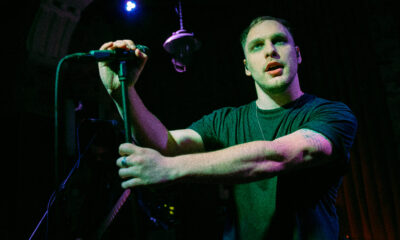
 Alternative/Rock19 mins ago
Alternative/Rock19 mins agoThe Cruel Knives Headline Top Night of British Rock at Manchester’s The Lodge [Photos]
-

 Music2 weeks ago
Music2 weeks agoTake That (w/ Olly Murs) Kick Off Four-Night Leeds Stint with Hit-Laden Spectacular [Photos]
-

 Alternative/Rock6 days ago
Alternative/Rock6 days agoThe V13 Fix #011 w/ Microwave, Full Of Hell, Cold Years and more
-

 Features2 weeks ago
Features2 weeks agoTour Diary: Gen & The Degenerates Party Their Way Across America
-

 Indie6 days ago
Indie6 days agoDeadset Premiere Music Video for Addiction-Inspired “Heavy Eyes” Single
-

 Folk1 week ago
Folk1 week agoKatherine Perkins Strikes the Right Tone with Her “Hold On” Music Video Premiere
-

 Country1 week ago
Country1 week agoBrooke Ashton Chats About Her “Someone” Single, Creative Process, and More!

